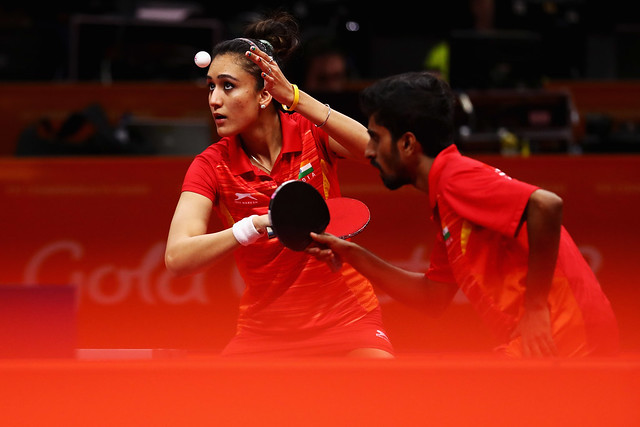by Ian Marshall, ITTF Publications Manager
However, it was a very different line up for Singapore when compared with four years later, only Gao Ning remained; he was supported by Pang Xue Jie and Ethan Poh Shao Feng both players who have yet to establish their authority on the international scene.
Similarly India was led by the voice of experience in the guise of Sharath Kamal Achanta but conversely he was supported by two players who in the last four years have made their present felt on the world stage, Sathiyan Gnanasekaran and Harmeet Desai.
Safe and secure, not a flicker of emotion, thoroughly efficient Gao Ning beat Harmeet Desai in three straight games (11-9, 11-5, 11-8), his performance as efficient as when at 2011 ITTF World Tour Grand Finals in London he beat Korea’s Ryu Seungmin and China’s Ma Lin the two most recent Olympic Games champions at the time.
Staying close to the table at all times, changing the pace of the play from the backhand, sometimes with control, sometimes fast, Gao Ning controlled matters from start to finish. In the third game, Massimo Costantini called “Time Out” with Gao Ning ahead 5-4; it made no difference; Gao Ning never relaxed his grip.
Singapore in the lead but that was not to last long, just as Gao Ning had controlled matters throughout in opposition to Harmeet Desai, so did Sharath Kamal Kamal Achanta when facing Ethan Poh Shao Feng. He won the opening two games with ease, in the third he established a 4-0 lead; Singaporean coach, Liu Jiayi called “Time Out” but it was only a token gesture. Sharath Kamal Achanta maintained the stranglehold (11-5, 11-4, 11-4).
“It’s better to play when your team is ahead than when your team is behind but we were pretty sure we knew their order and that Gao Ning could win both his matches. I knew that from the start of the match I must keep on top, keep him under pressure, no easy mistakes.” Sharath Kamal Achanta
Matters level, Singapore increased their advantage, Harmeet Desai and Sathiyan Gnanasekaran combined to win the doubles against Ethan Poh Shao Fang and Pang Xue Jie (8-11, 11-7, 11-9, 11-8). The crucial moments being in the second game when after losing first, the Indian duo trailed 4-5, called “Time Out” and progressed to win the game; also when it was parity in the third at 9-all.
“We were not receiving service well at the start of the match, we needed to be better in the short game; in the open play, in the rallies we were confident.” Harmeet Desai
India in the ascendancy, just as he had proved too secure for Harmeet Desai, it was the same against Sathiyan Gnanasekaran (11-5, 10-12, 11-4, 13-11); great credit to Sathiyan Gnanasekaran who fought for the cause Gao Ning was not to be moved.
Two wins from Gao Ning, the same was demanded from Sharath Kamal Achanta; he duly delivered overcoming some tense moments in the second game, he trailed 8-10 before winning four points in a row to eventually emerge successful in three straight games (11-5, 12-10, 12-10).
“I was nervous, I did feel the pressure; I couldn’t find the balance in the match between playing safe and taking risks. In the second game I was down 2-6 and 8-10 but I had my serves to come, I took a chance. The doubles was crucial, when Harmeet and Sathiyan came to bench at the Time Out in the second game I told them to keep thing simple.” Sharath Kamal Achanta
India now proceeds to the gold medal fixture; Singapore contests bronze. Both engagements are scheduled for later in the day; the bronze medal duel at 4.00pm, the top prize the gold medal duel at 6.30 pm (local time).


